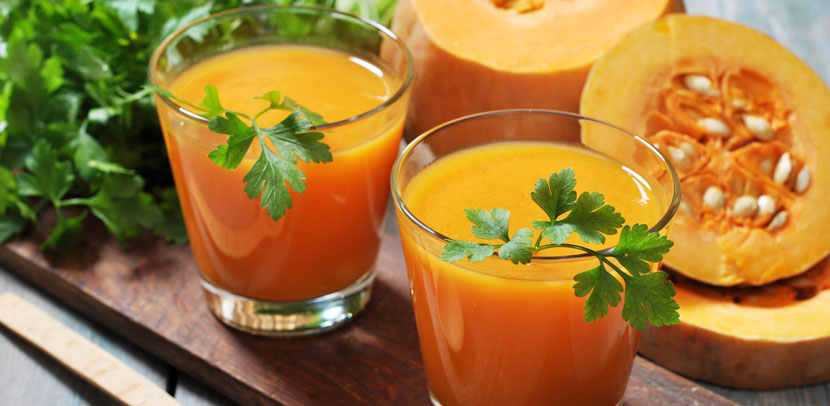Why You Need to Add More Pumpkin to Your Diet

Not usually a favorite vegetable for most people, pumpkin is actually loaded with antioxidants, vitamins, and fiber and can give your well-being the boost it needs.
Health benefits
Pumpkins are an ideal source of vitamin C and a rich source of minerals such as zinc, calcium, magnesium, and potassium, all which contribute towards a healthy immune system, protecting against colds and flu, and for clear, healthy skin.
Another key health benefit is the large amounts of antioxidant beta-carotene present within pumpkin which is what gives them their orange color. Beta-carotene has properties that can help improve immune function.
Pumpkins are also high in lutein and zeaxanthin, which scavenge free radicals in the lens of the eye. This may help prevent the formation of cataracts and reduce the risk of macular degeneration, a serious eye problem that usually results in blindness.
Good news for diabetics: As pumpkin is low on the glycemic index, it’s a better source of carbohydrates than potato for balancing blood sugar. As we need carbohydrates for energy, pumpkin will provide slow-releasing carbohydrates that will prevent blood sugar dips if combined with protein or included in a salad.
The Seeds
Even pumpkin seeds are a good source of protein, zinc, and other minerals and a rich source of essential fatty acids. Although the roasted pumpkin seeds tend to be better-tasting, you’ll receive higher nutritional value from eating the seeds raw.
The Oil
When used for cooking or as a salad dressing, pumpkin seed oil has many benefits. It’s high in phytosterols, plant-based fatty acids that have been shown to reduce levels of LDL cholesterol and also protect against many cancers. It’s also high in essential fatty acids (EFA’s) which include a plethora of benefits, among them the lubrication of all tissues, including the skin and the maintenance of healthy blood vessels and nerves.








Hello healthmagazine.ae Owner, very same right here: Link Text
To the healthmagazine.ae webmaster, Your posts are always on topic and relevant.
Hi healthmagazine.ae admin, Good work!
To the healthmagazine.ae administrator, Your posts are always interesting.
Dear healthmagazine.ae owner, Your posts are always well-timed and relevant.
Dear healthmagazine.ae owner, Thanks for the well-structured and well-presented post!
Hi healthmagazine.ae administrator, Thanks for the post!
Hello healthmagazine.ae owner, Your posts are always informative.
Hi healthmagazine.ae webmaster, You always provide clear explanations and definitions.
Dear healthmagazine.ae administrator, You always provide in-depth analysis and understanding.
Dear healthmagazine.ae administrator, Your posts are always informative.
Hello healthmagazine.ae admin, Good to see your posts!